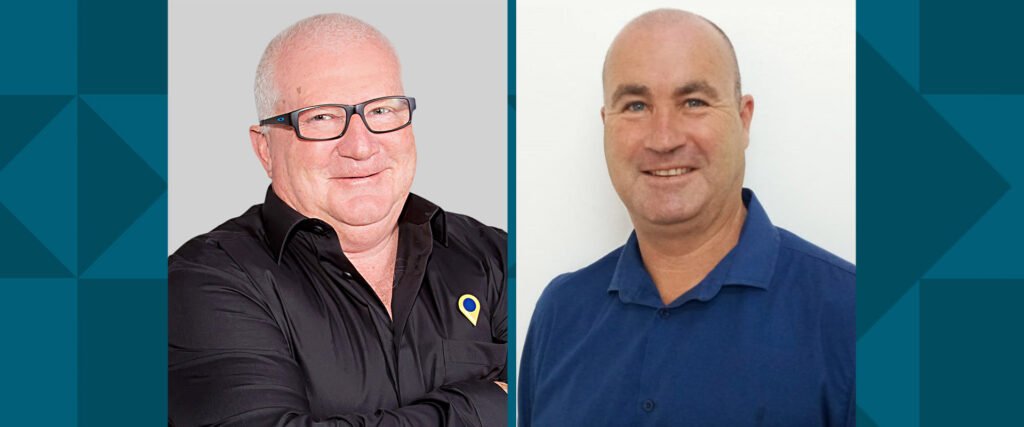MAIN IMAGE: Gavin O’Leary, property practitioner at Just Property Port Elizabeth; Lawrence Homan, franchisee in Margate, Berea and Pinetown and Westville.
Staff Writer
The different living options for older people can be quite confusing. “It’s important to go in with your eyes open”, says Gavin O’Leary, property practitioner at Just Property Port Elizabeth and Lawrence Homan, franchisee in Margate, Berea and Pinetown and Westville.
It is also important for property practitioners to be on top of these differences as they will often be asked by potential clients what the best would be for their specific circumstances.
Old-age home and a retirement village?
O’Leary explains that the general understanding is that old-age homes offer the bare minimum about facilities. The accommodation comes in various forms, but in most cases, seniors will share bathrooms, a dining room, visitors’ lounges and sometimes accommodation too. Medical facilities/services are normally provided. However, the standard can differ from home to home. Old-age homes are sometimes referred to as nursing homes as there is daily assistance for the elderly who need it.
“Retirement villages are popular with retirees looking to retain their independence while living in a secure and safe environment. Usually, retirement villages offer stand-alone homes of different sizes and configurations, garages/carports, small gardens, community halls for entertainment purposes, and various common areas (parks, gardens). Most offer medical facilities and services, and some villages also offer frail care facilities,” says O’Leary.
Ownership models
O’Leary explains that the purchaser buys the right to live in a house/unit for the remainder of their life, in accordance with the housing development scheme for Retired Persons Act. The purchaser never owns the property, and the life right transaction is not processed through the Deeds Office. Ownership remains with the developer. Life rights cannot be transferred and can only expire on the death of the holder.
The option of sectional title is the same as any other sectional title transfer where the purchaser owns the home and is registered in the deeds office, attracting attorney transfer fees and transfer duty if the purchase is over one million. The purchaser or their heirs must pay a percentage of the resale value to the levy fund.
“As with Sectional Title, in the case of a Full title the purchaser owns the property. The freehold section would normally be run by a Homeowners Association and will be an easily sellable asset as it is freestanding,” says Homan.
Pros and cons of life rights
Pros
- The transaction is not processed via the deeds office, saving on fees.
- The transfer process is quick and easy
- Transfer may be affected on the day/date as recorded in the contract
- No transfer duty is applicable
- The purchaser retains the right to use the home/unit for the remainder of their and spouse’s life
- The developer retains the ownership of the property and will be responsible for the upkeep of the buildings, facilities, and common areas -this ensures that the ongoing resale value is maintained or enhanced
- A life-right holder may, with permission, upgrade the home’s interior, possibly enhancing the unit’s resale value.
- There are usually no special levies.
Cons
- No finance options – all transactions must be cash related
- Life rights cannot be endowed on the passing of the life rights holder
- Different resale models relating to pay-outs (% of the original price) and profits prevail in different retirement villages. It is vitally important to evaluate each option offered.
- In the unlikely event of development being declared insolvent, the life right holder will be viewed as a creditor and, as such, will be last in line to benefit when assets are distributed
- Only the life right owner or nominated occupant may reside in the purchased unit
- Homes with Life Rights may be cheaper than Sectional Title or Freehold, but you might wait a longer period to get your money out.
- Life rights is a complex business model – you buy the right to live in a unit for an unknown period. The resale is influenced by the property market.
Assisted living vs frail care
Assisted living may suit a person who requires a little assistance but wishes to remain living in their home. Help will be supplied with daily living activities but not nursing.
“Frail care would suit someone who needs skilled medical professionals who provide daily nursing as determined by either a medical practitioner or the family,” says O’Leary. Homan notes that most care facilities will assess the patient prior to admission to ensure that the frail care facility is able to provide the required care.
Ask these questions when deciding:
- Am I buying a life right or sectional title?
- May I see a copy of the contract, including the rules and regulations?
- Would I be able to upgrade/downscale over time?
- What levies are applicable, and what do they cover?
- Rates and taxes, water, and electricity – how are these charged, and what are the applicable tariffs?
- What medical facilities and services are available?
- Is there a frail care facility?
- Where is the nearest hospital?
- What is the access to emergency services?
- Do you have security services and provisions in place?
- What services are provided regarding hairdressing, exercise, cooked meals etc?
- What is your pet policy?
- Who are the managing agents?
- Are visiting family/friends allowed to stay over when visiting?
- Are there shopping centres/convenience stores nearby?
- Are there opportunities to socialise/is entertainment provided for residents?
- Questions relating to your personal needs and preferences – e.g., closest places of worship.
Before you start shopping around, ask yourself some serious questions regarding your health and finances. Look ahead to what you are likely to need in terms of care – health, cooked meals, frail care. And don’t forget to do a thorough reckoning of your current and future financial status before making any decisions.








